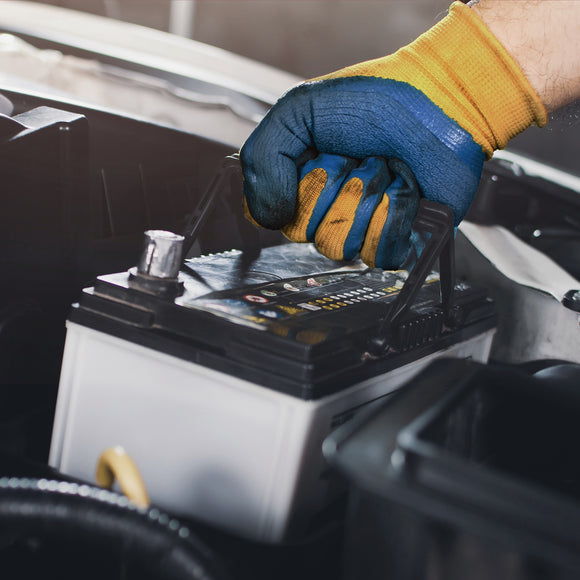
How to Prolong Your Car Battery Life
For automotive enthusiasts, maintaining a vehicle isn't just about aesthetics or performance—it's about longevity. One of the most critical components that often gets overlooked is the car battery. A well-maintained battery can mean the difference between a smooth ride and an unexpected breakdown. Whether you drive a classic muscle car or a modern sports car, prolonging your battery’s life is essential. Here’s how you can keep your car battery in top condition.
- Understand Your Battery’s Lifespan
Car batteries typically last between 3 to 5 years. However, several factors, including climate, driving habits, and the type of battery, can impact this lifespan. Knowing the expected life of your battery allows you to be proactive rather than reactive, reducing the chances of being caught off guard.
- Tip: Regularly check the manufacturing date on your battery. If it's approaching the 3-year mark, start paying closer attention to its performance.
- Regularly Inspect and Clean Battery Terminals
Corrosion on battery terminals is a common issue that can lead to poor electrical connections and reduced battery efficiency. Regular inspection and cleaning can help prevent this.

- How to Clean: Use a mixture of baking soda and water to clean the terminals. Disconnect the battery (starting with the negative terminal), scrub the terminals with a toothbrush or wire brush, rinse with water, and dry thoroughly.
- Drive Your Car Regularly
For those who store their vehicles for long periods, especially during winter, battery discharge can be a significant issue. When a car isn’t driven regularly, the battery gradually loses its charge.
- Tip: Try to drive your car at least once a week, even if only for 15-20 minutes. This will help maintain the battery’s charge. If this isn’t possible, consider investing in a battery maintainer or trickle charger.
- Avoid Short Trips Whenever Possible
Short trips don’t allow your battery to fully recharge, especially if you have accessories like headlights or the radio running. Over time, this can lead to a significant reduction in battery life.
- Tip: Combine errands to reduce the number of short trips, or take a longer route to ensure the battery has enough time to recharge fully.
- Monitor and Maintain Proper Battery Voltage
Your battery should maintain a voltage of about 12.6 volts when the car is off and around 13.7 to 14.7 volts when the engine is running. Regularly checking the voltage can help you spot potential issues before they escalate.
- Tool Needed: A multimeter is an inexpensive tool that can help you measure battery voltage. It’s a small investment that can save you a lot of trouble.
- Reduce Power Drain When the Engine Is Off
Modern vehicles come equipped with various electronics that can continue to draw power even when the car is off. Over time, this can drain your battery.
- Tip: Ensure all lights are turned off when exiting the vehicle. Unplug any devices, such as phone chargers, that might continue drawing power. Consider switching off non-essential electronics like the radio or air conditioning before turning off your car.
- Protect Your Battery from Extreme Temperatures
Both extremely hot and cold temperatures can significantly impact your battery's performance and lifespan. Heat can cause the battery fluid to evaporate, leading to damage, while cold can reduce the battery's ability to hold a charge.

The durable, corrosion-resistant washers extend the battery life by preventing current leakage and promoting a tight seal, making them ideal for battery posts or other metal connections
- Summer Tip: Park in the shade whenever possible. Consider using a thermal battery cover to protect against extreme heat.
- Winter Tip: If you live in a cold climate, consider a battery heater to keep your battery warm enough to function effectively.
- Keep Your Battery Securely Fastened
A loose battery can vibrate, which may lead to internal damage and short circuits. Ensuring your battery is properly secured will prevent unnecessary wear and tear.
- Tip: Regularly check that your battery is tightly fastened. If you notice any movement, tighten the connections.
- Test Your Battery Regularly
Regular battery testing can help you understand its condition and anticipate potential issues. Many auto parts stores offer free battery testing, or you can purchase a battery tester.
- When to Test: It’s a good practice to test your battery before the onset of extreme weather seasons, such as summer or winter, when your battery is under the most stress.
- Replace When Necessary
No matter how well you maintain your battery, it will eventually need to be replaced. Recognizing the signs of a failing battery can save you from being stranded.
- Signs of a Failing Battery: Slow engine crank, dim headlights, clicking sound when turning the key, or the need to frequently jump-start your car.
Prolonging your car battery’s life isn’t just about avoiding inconvenience; it’s about ensuring the overall health and performance of your vehicle. By following these tips, you can extend your battery's lifespan and maintain the reliability of your car. Remember, a little preventive care can go a long way in keeping your ride smooth and your adventures on the road uninterrupted.
For more automotive tips and tricks, stay tuned to our blog. Happy driving!
